Betriebliche Dynamiken und Beschäftigungsergebnisse
Firmengründungen und -schließungen sind in einer Marktwirtschaft für die Reallokation von Ressourcen, strukturellen Wandel und damit für die wirtschaftliche Entwicklung von zentraler Bedeutung und spielen vor allem im Hinblick auf die wirtschaftliche Transformation Ostdeutschlands eine zentrale Rolle. Gleichzeitig können die mit dem Strukturwandel verbundenen Arbeitsplatzverluste dramatische Folgen für betroffene Arbeitnehmer haben, wie z.B. Arbeitslosigkeit, Einkommensverluste oder eine geringere Arbeitsplatzqualität. Diese Forschungsgruppe untersucht mithilfe mikroökonometrischer Methoden Gründungen, Wachstumsprozesse und das Scheitern von Unternehmen, die Anzahl und Qualität der von Neugründungen geschaffenen Arbeitsplätze und die Folgen von Firmenschließungen für betroffene Arbeitnehmer und Arbeitnehmerinnen, vor allem in Bezug auf Arbeitsmarktergebnisse wie Beschäftigung und Löhne.
Forschungscluster
Produktivität und InstitutionenIhr Kontakt

Mitglied - Abteilung Strukturwandel und Produktivität
PROJEKTE
01.2020 ‐ 06.2024
Europas populistische Parteien im Aufwind: die dunkle Seite von Globalisierung und technologischem Wandel?
VolkswagenStiftung
Die Globalisierung hat zwar allgemein den Wohlstand gesteigert, aber in vielen Regionen Europas auch zu Arbeitslosigkeit, Lohnungleichheit, Abwanderung und Überalterung geführt. Das Projekt untersucht, ob diese ökonomischen Lasten zu Wählerstimmen für populistische Parteien führen.
01.2019 ‐ 06.2022
MICROPROD („Raising EU Productivity: Lessons from Improved Micro Data“)
Europäische Kommission
Ziel von MICROPROD ist es, zu einem besseren Verständnis der Herausforderungen beizutragen, die die vierte industrielle Revolution in Europa mit sich bringt. Verliert das Produktivitätswachstum im Kontext von Globalisierung und Digitalisierung an Schwung, und wenn ja, warum?
This project has received funding from the European Union’s Horizon 2020 research and innovation programme under grant agreement No 764810.
07.2018 ‐ 12.2020
Firmenlohndifferentiale in unvollkommenen Arbeitsmärkten: Die Rolle von Marktmacht und industriellen Beziehungen in der Aufteilung der Beschäftigungsrenten zwischen Arbeitnehmern und Arbeitgebern
Deutsche Forschungsgemeinschaft (DFG)
Ziel dieses Projekts ist es, die Aufteilung der Beschäftigungsrenten auf unvollkommenen Arbeitsmärkten und den Einfluss von Arbeitsmarktinstitutionen wie Tarifbindung und betrieblicher Mitbestimmung auf Firmenlohndifferentiale zu untersuchen. Über die Grundlagenforschung hinaus hat das Projekt damit Potential, wichtige wirtschaftspolitische Debatten zur institutionellen Ausgestaltung des Lohnfindungsprozesses zu informieren.
02.2019 ‐ 09.2019
Auswertung des IAB-Betriebspanels 2018 und Erstellung eines Ergebnisberichts für West- und Ostdeutschland
04.2016 ‐ 03.2019
Lohn- und Beschäftigungseffekte von Insolvenzen
Deutsche Forschungsgemeinschaft (DFG)
Ziel des Projekts ist es, erstmals den Prozess und die Folgen des Scheiterns von Unternehmen ausführlich zu analysieren. Insbesondere ist es im Rahmen dieses Projekts erstmals möglich, die Folgen kleinbetrieblicher Insolvenzen zu erforschen, was vor allem deshalb relevant ist, weil Arbeitnehmer in Betrieben mit weniger als zehn Beschäftigten etwa viermal so häufig von Insolvenzen betroffen sind wie Arbeitnehmer in Großbetrieben.
01.2018 ‐ 12.2018
Auswertung des IAB-Betriebspanels 2017 und Erstellung eines Ergebnisberichts für West- und Ostdeutschland
01.2017 ‐ 09.2017
Auswertung des IAB-Betriebspanels 2016 und Erstellung eines Ergebnisberichts für West- und Ostdeutschland
Referierte Publikationen
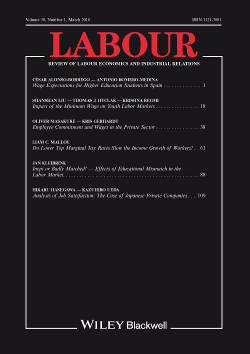
Losing Work, Moving Away? Regional Mobility After Job Loss
in: LABOUR: Review of Labour Economics and Industrial Relations, Nr. 4, 2017
Abstract
Using German survey data, we investigate the relationship between involuntary job loss and regional mobility. Our results show that job loss has a strong positive effect on the propensity to relocate. We also analyse whether displaced workers who relocate to a different region after job loss are better able to catch up with non-displaced workers in terms of labour market performance than those staying in the same region. Our findings do not support this conjecture as we find substantial long-lasting earnings losses for movers and stayers and even slightly but not significantly higher losses for movers.
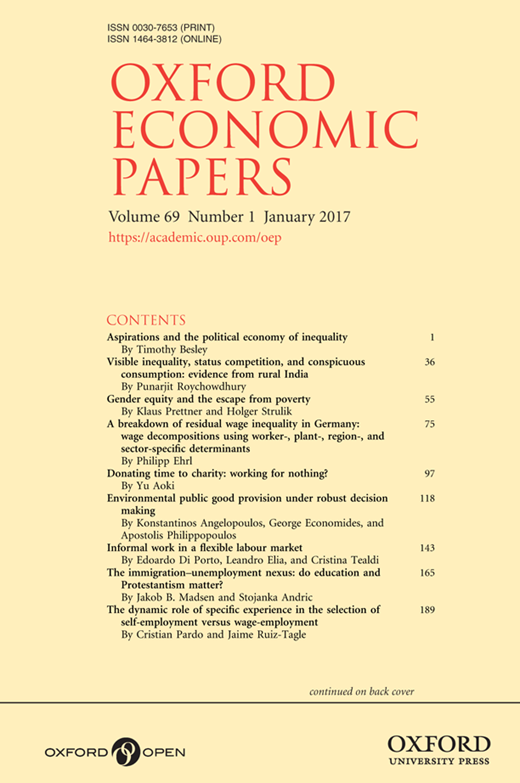
Coming to Work While Sick: An Economic Theory of Presenteeism With an Application to German Data
in: Oxford Economic Papers, Nr. 4, 2017
Abstract
Presenteeism, i.e. attending work while sick, is widespread and associated with significant costs. Still, economic analyses of this phenomenon are rare. In a theoretical model, we show that presenteeism arises due to differences between workers in (healthrelated) disutility from workplace attendance. As these differences are unobservable by employers, they set wages that incentivise sick workers to attend work. Using a large representative German data set, we test several hypotheses derived from our model. In line with our predictions, we find that bad health status and stressful working conditions are positively related to presenteeism. Better dismissal protection, captured by higher tenure, is associated with slightly fewer presenteeism days, whereas the role of productivity and skills is inconclusive.
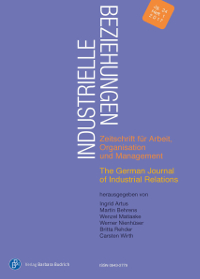
Betriebsräte und andere Formen der betrieblichen Mitarbeitervertretung – Substitute oder Komplemente?
in: Industrielle Beziehungen, Nr. 3, 2017
Abstract
Der Beitrag untersucht anhand des IAB-Betriebspanels (2004-2013) die Verbreitung, Entwicklung und Interdependenz von Betriebsräten und anderen, meist betriebsinitiierten Formen der Mitarbeitervertretung (wie z.B. Runde Tische). In der Privatwirtschaft sind Betriebsräte gleich häufig zu finden wie andere Mitarbeitervertretungen, doch kommt eine gleichzeitige Existenz beider Gremien in einem Betrieb kaum vor. Ökonometrische Analysen mit rekursiven Probit-Modellen verdeutlichen, dass z.T. unterschiedliche Faktoren das Vorhandensein dieser alternativen Formen der Mitarbeitervertretung erklären und dass bezüglich ihrer Existenz, Gründung und Auflösung Betriebsräte und andere Mitarbeitervertretungen negativ miteinander korrelieren. Dies deutet darauf hin, dass zwischen beiden Formen der Arbeitnehmerpartizipation eine überwiegend substitutive Beziehung besteht.
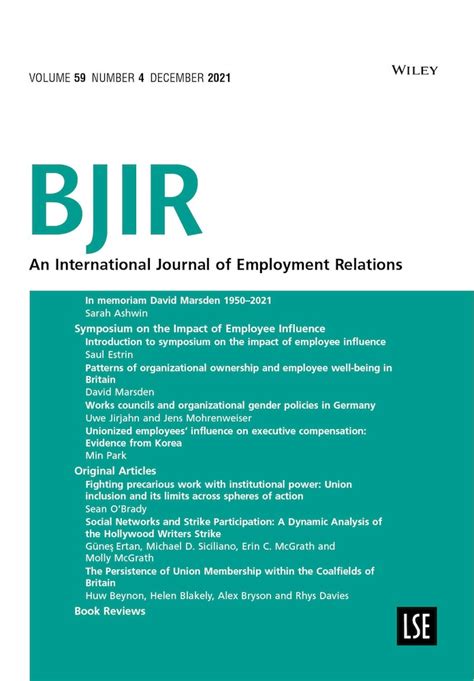
The Dynamic Effects of Works Councils on Labour Productivity: First Evidence from Panel Data
in: British Journal of Industrial Relations, Nr. 2, 2017
Abstract
We estimate dynamic effects of works councils on labour productivity using newly available information from West German establishment panel data. Conditioning on plant fixed effects and control variables, we find negative productivity effects during the first five years after council introduction but a steady and substantial increase in the councils’ productivity effect thereafter. Our findings support a causal interpretation for the positive correlation between council existence and plant productivity that has been frequently reported in previous studies.
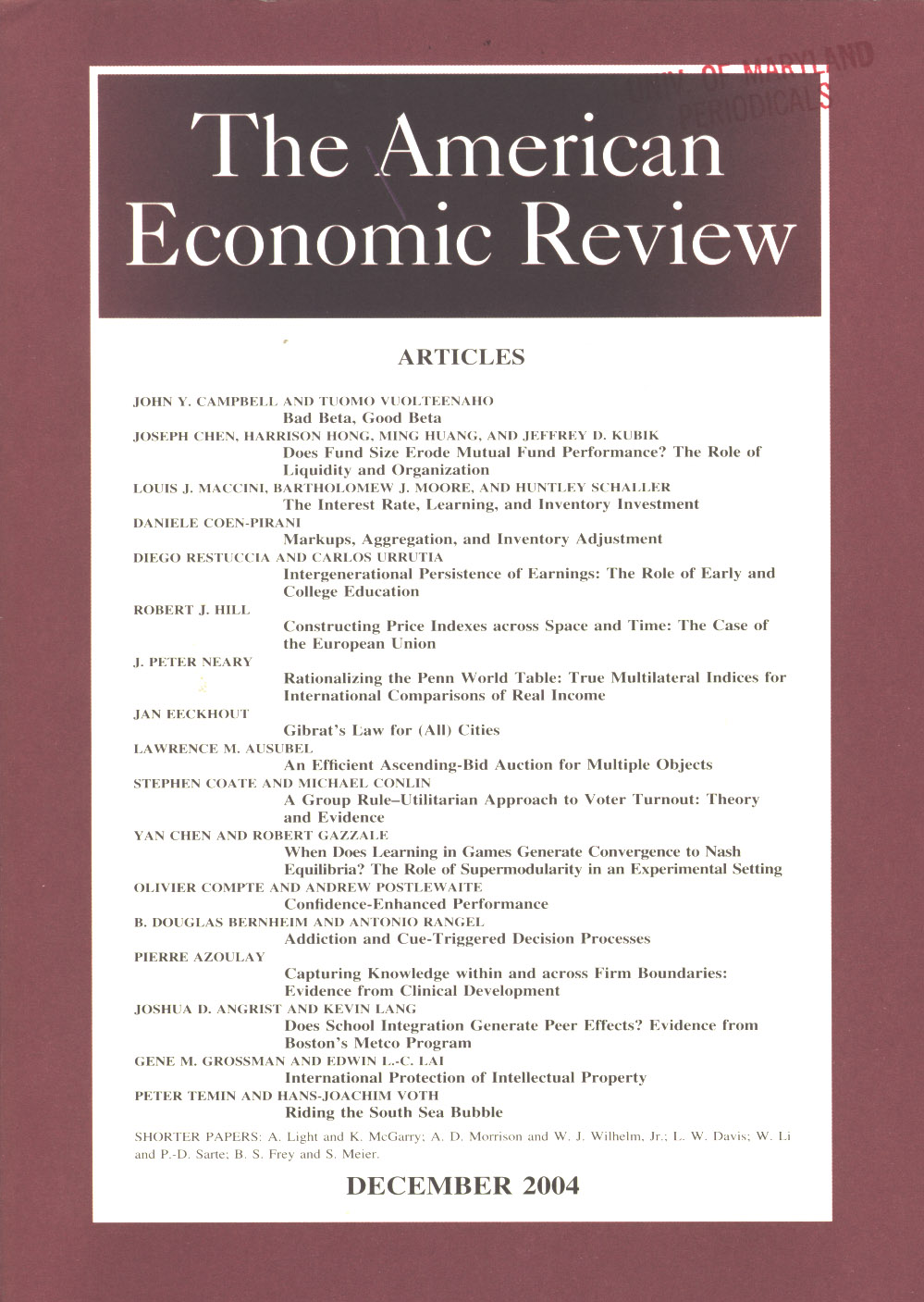
Transferability of Skills across Sectors and Heterogeneous Displacement Costs
in: American Economic Review: Papers and Proceedings, Nr. 5, 2017
Abstract
We use rich German administrative data to estimate new measures of skill transferability between manufacturing and other sectors. These measures capture the value of workers' human capital when applied in different sectors and are directly related to workers' displacement costs. We estimate these transferability measures using a selection correction model, which addresses workers' endogenous mobility, and a novel selection instrument based on the social network of workers. Our results indicate substantial heterogeneity in how workers can transfer their skills when they move across sectors, which implies heterogeneous displacement costs that depend on the sector to which workers reallocate.
Arbeitspapiere
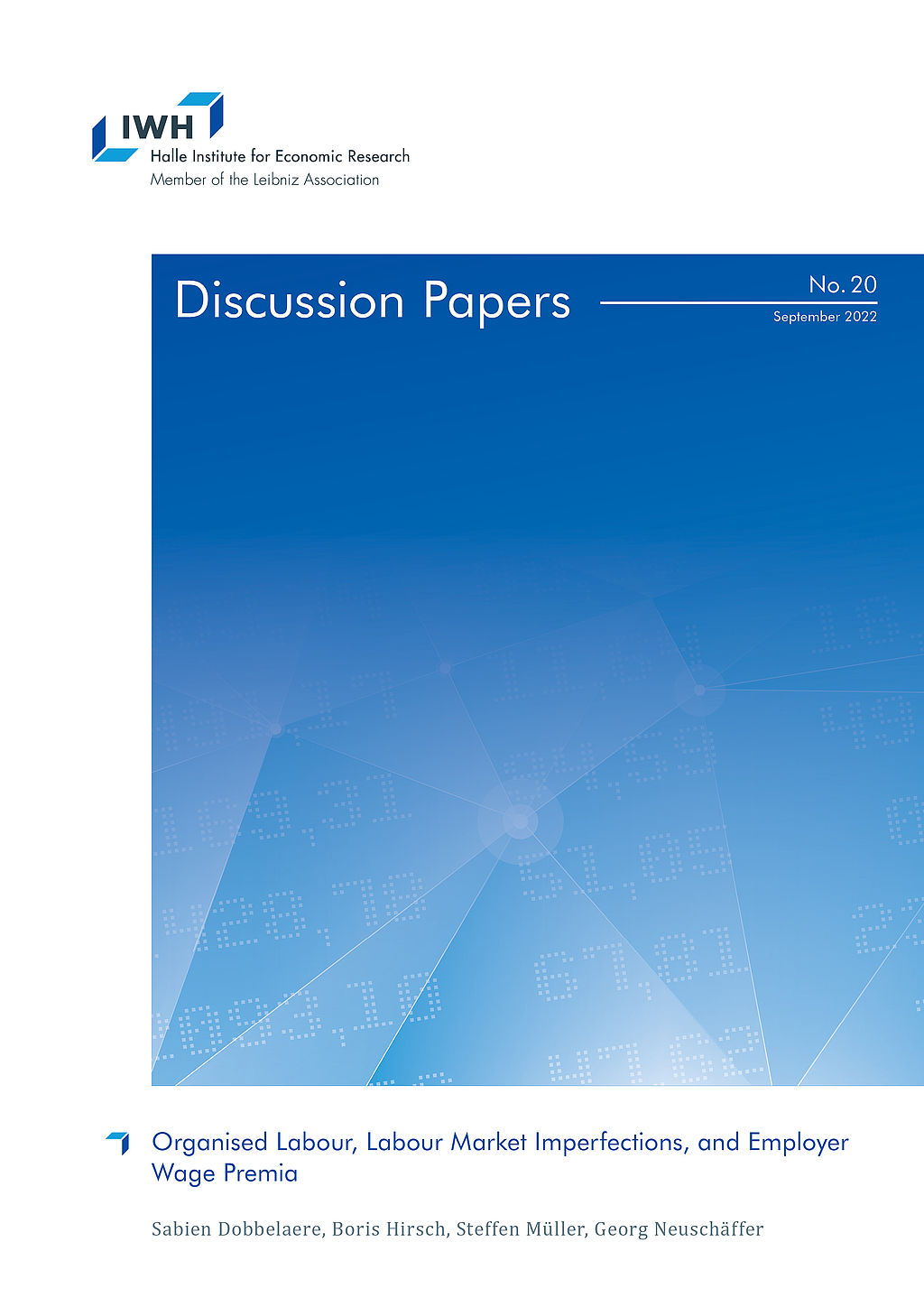
Organised Labour, Labour Market Imperfections, and Employer Wage Premia
in: IWH Discussion Papers, Nr. 20, 2022
Abstract
This paper examines how collective bargaining through unions and workplace co-determination through works councils relate to labour market imperfections and how labour market imperfections relate to employer wage premia. Based on representative German plant data for the years 1999–2016, we document that 70% of employers pay wages below the marginal revenue product of labour and 30% pay wages above. We further find that the prevalence of wage mark-downs is significantly smaller when organised labour is present and that the ratio of wages to the marginal revenue product of labour is significantly bigger. Finally, we document a close link between labour market imperfections and mean employer wage premia, that is wage differences between employers corrected for worker sorting.
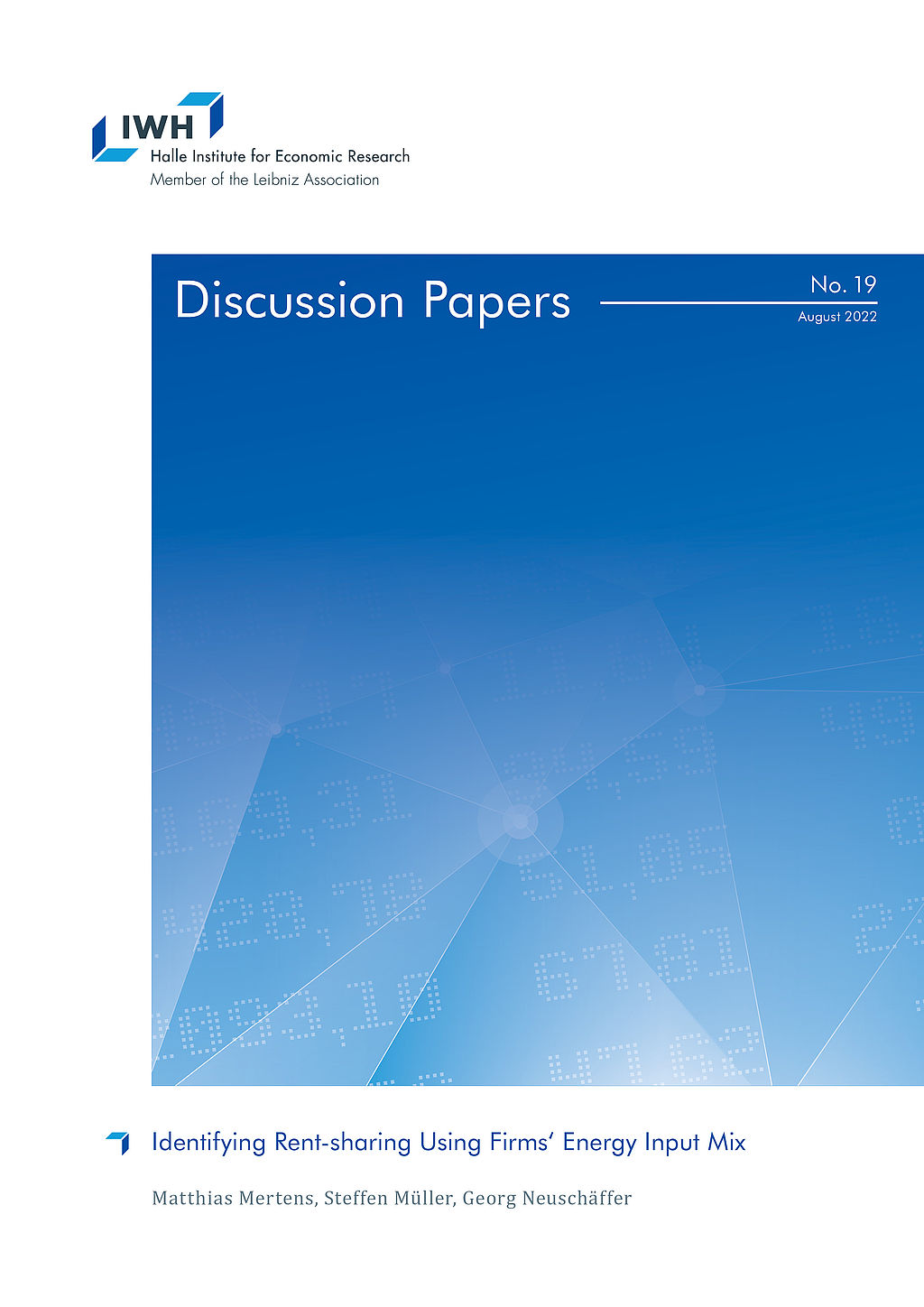
Identifying Rent-sharing Using Firms' Energy Input Mix
in: IWH Discussion Papers, Nr. 19, 2022
Abstract
We present causal evidence on the rent-sharing elasticity of German manufacturing firms. We develop a new firm-level Bartik instrument for firm rents that combines the firms‘ predetermined energy input mix with national energy carrier price changes. Reduced-form evidence shows that higher energy prices depress wages. Instrumental variable estimation yields a rent-sharing elasticity of approximately 0.20. Rent-sharing induced by energy price variation is asymmetric and driven by energy price increases, implying that workers do not benefit from energy price reductions but are harmed by price increases. The rent-sharing elasticity is substantially larger in small (0.26) than in large (0.17) firms.
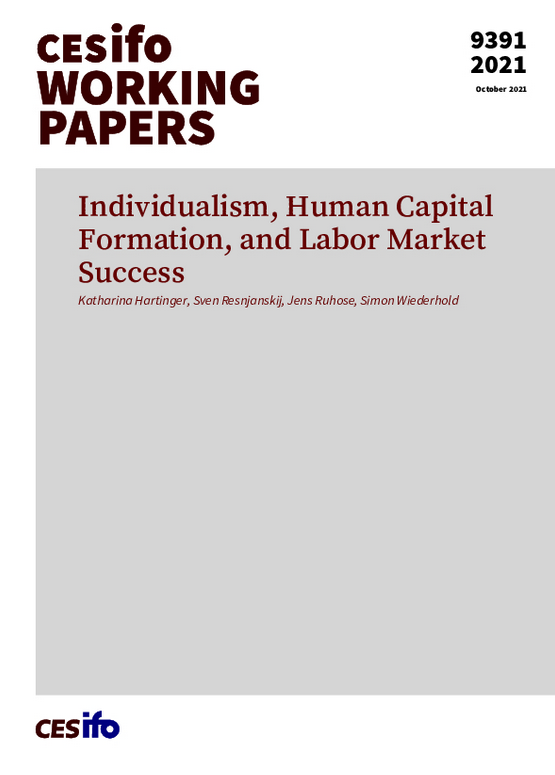
Individualism, Human Capital Formation, and Labor Market Success
in: CESifo Working Paper, Nr. 9391, 2021
Abstract
There is an ongoing debate about the economic effects of individualism. We establish that individualism leads to better educational and labor market outcomes. Using data from the largest international adult skill assessment, we identify the effects of individualism by exploiting variation between migrants at the origin country, origin language, and person level. Migrants from more individualistic cultures have higher cognitive skills and larger skill gains over time. They also invest more in their skills over the life-cycle, as they acquire more years of schooling and are more likely to participate in adult education activities. In fact, individualism is more important in explaining adult skill formation than any other cultural trait that has been emphasized in previous literature. In the labor market, more individualistic migrants earn higher wages and are less often unemployed. We show that our results cannot be explained by selective migration or omitted origin-country variables.
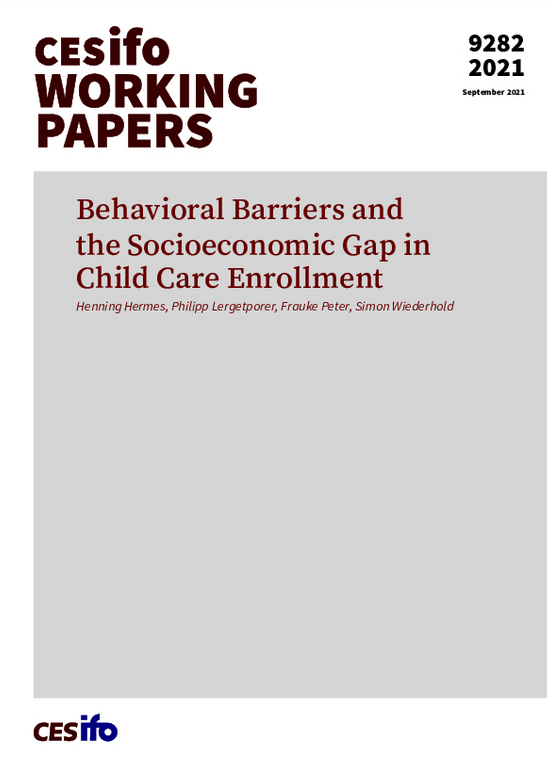
Behavioral Barriers and the Socioeconomic Gap in Child Care Enrollment
in: CESifo Working Paper, Nr. 9282, 2021
Abstract
Children with lower socioeconomic status (SES) tend to benefit more from early child care, but are substantially less likely to be enrolled. We study whether reducing behavioral barriers in the application process increases enrollment in child care for lower-SES children. In our RCT in Germany with highly subsidized child care (n > 600), treated families receive application information and personal assistance for applications. For lower-SES families, the treatment increases child care application rates by 21 pp and enrollment rates by 16 pp. Higher-SES families are not affected by the treatment. Thus, alleviating behavioral barriers closes half of the SES gap in early child care enrollment.
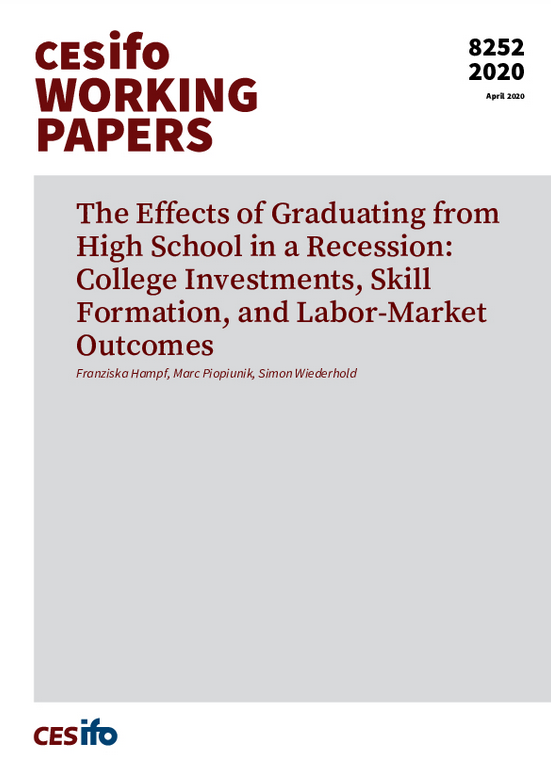
The Effects of Graduating from High School in a Recession: College Investments, Skill Formation, and Labor-Market Outcomes
in: CESifo Working Paper, Nr. 8252, 2020
Abstract
We investigate the short- and long-term effects of economic conditions at high-school graduation as a source of exogenous variation in the labor-market opportunities of potential college entrants. Exploiting business cycle fluctuations across birth cohorts for 28 developed countries, we find that bad economic conditions at high-school graduation increase college enrollment and graduation. They also affect outcomes in later life, increasing cognitive skills and improving labor-market success. Outcomes are affected only by the economic conditions at high-school graduation, but not by those during earlier or later years. Recessions at high-school graduation narrow the gender gaps in numeracy skills and labor-market success.


















